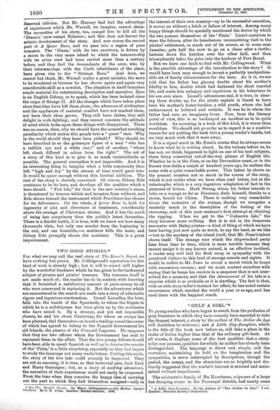" ONLY A GIRL." 4
To young readers who have begun to revolt from the profusion of gory literature in which they have recently been expected to take the deepest interest, a story by the author of The Atelier du Lys will doubtless be welcome ; and A Little Step-Laughter, which is the title of the book now before us, will take a place in the ranks of fiction higher than that of the ordinary gift-book. At all events, it displays some of the best qualities that a story- teller can possess, qualities for which its author has already been distinguished. The language is direct and simple, and the narrative, maintaining its hold on the imagination and the sympathies, is never interrupted by descriptions, though the period, the scenes, and the characters are so brightly and dis- tinctly suggested that the reader's interest is aroused and main- tained without impediment.
The aristocratic family of Da Maurienne, seigneurs of a large but decaying estate in the Provencal district, had nearly come
• A Little Step-Daughter. By the Author of "The Atelier du Lye." 1 col. Loudon; /Urines] Society's Depository. to an end, when, in the early part of the last century, the widowed Baron, who with his lady, just dead, had lived chiefly in Paris, sat in a bare room in the old cluilean, attended by his steward, who had brought the Here do raison, the genealogical and family record, that the name of C16mence might be inscribed in it. Cl6mence was the child in giving birth to whom the Baronue had bidden farewell to the dreary elatsau, the gay, dissolute Court, and this mortal life ; and so little had the Du Mauriennes ever thought of their daughters, who mostly retired to convents at the earliest possible opportunity, that the steward, who, like everybody concerned, had been earnestly hoping for the birth of an heir to the waning power and the impoverished domain, could only from a sense of duty refer to the disappointing event by saying to the Baron,— " Yoti will record what has happened in the liars de raison, my Lord." Cl6mence, who from her earliest years was deeply sensible that, being " only a girl," she need expect little consideration, was duly sent out to nurse in the family of one of the peasants on the estate, where she learnt little except the meaning of poverty and the discontent that accom- panied it, and which found a vent in ill-temper and half-con- cealed complaints against the lords, who, because they kept the name of feudal Barons, were credited with the imposi- tion of the crushing taxation which was really due to the intendants of provinces, and agents of the Government. As the Da Itaurienne steward would never abate a jot of the dignity of the family, he continued to claim for his lord the abso- lute power which had long before passed from the family, and the consequence was that the oppressed peasantry neither knew, nor wanted to know, the Baron, who was in reality a just and humane man, desiring to improve the condition of the poor, but not quite knowing how to set about it. There were smugglers, too, who sometimes hovered about the villages when conveying contraband goods, and especially salt, on which the gabells was so heavy as to press cruelly on the peasantry. Some of these free-traders having been taken and sentenced to be hanged, their wives and children went to the &edam with tears to beg for their lives, a petition which the Baron could not have granted if he had been at home, but which the old steward, with the dignity of the family in view, dismissed as though Da Maurienne had refused to grant it. This was the state of affairs when Cl6mence was taken back to the cheiteau to learn to sew and to read. The child's otherwise silent, half- solitary life was mitigated by the kindly protection of the steward, who could not forget that, after all, she was a daughter of the family, and was varied by the complaints and asperities of a jealous housekeeper. But the feeling that, being "only a girl," she was of little or no importance, did not injure her naturally sweet and modest nature ; so that when the news arrived that the Baron, her father, was on the way home from a distant province, whence he brought a young wife, it gave her no anxiety except that involved in the fear that her desire to love and to have some alight gleam of affection bestowed on her might be vain. This threatened disappointment seemed likely to be fulfilled when the bride and bridegroom arrived with a number of guests, and here the hope that there would some day be an heir whom she might be suffered to call brother was but a light fancy to ponder over along with her shy, unexpressed affection for the handsome lady who, with many loving intentions, is unable to perceive the meaning of her little step-daughter's wistful looks. Not till Cidmence has departed for the convent, where she is to finish her education, does the Baroness feel her heart moved with a great tenderness for the child ; but by that time the smugglers, who have nursed their old grudge against Da Manrienne, and have bribed the gipsies to join them, are able, as they think, to take an appropriate vengeance. By an accident, their main intention is frustrated ; but Cl4mence, instead of reaching the convent, encounters a new and strange experience, with the responsibility of a solemn vow, in the company of a sad and silent woman, the keeper of the magnanerie, the silkworm-house in a village of the Camargue. Of the strange life there, the dark family secret, the explana- tion of which is so intimately associated with the recovery of Cl6mence by her warm-hearted and beautiful step-mother, and of the arrest and pardon of "the Coquihado," it would not be *air to the reader to give any account; but we warmly commend the book for its freshness and skilful simplicity of treatment, no less than for its genuine interest. Of the illustrations, it can only be said that the book would be better without them. They are hideous.























































 Previous page
Previous page